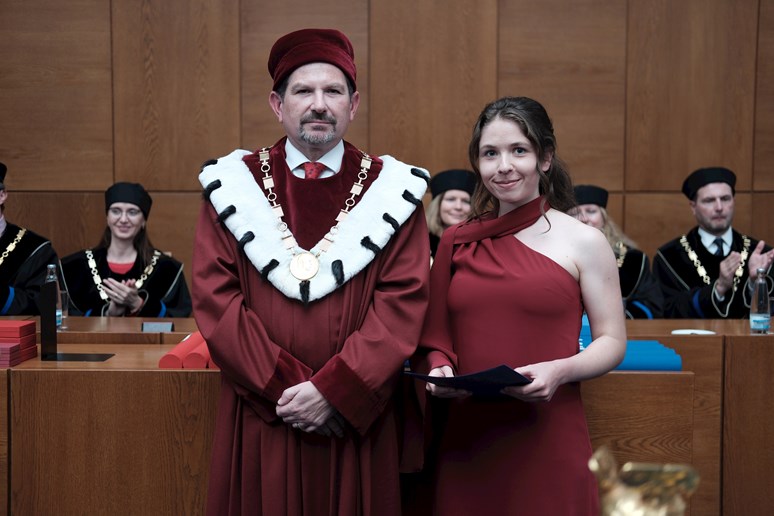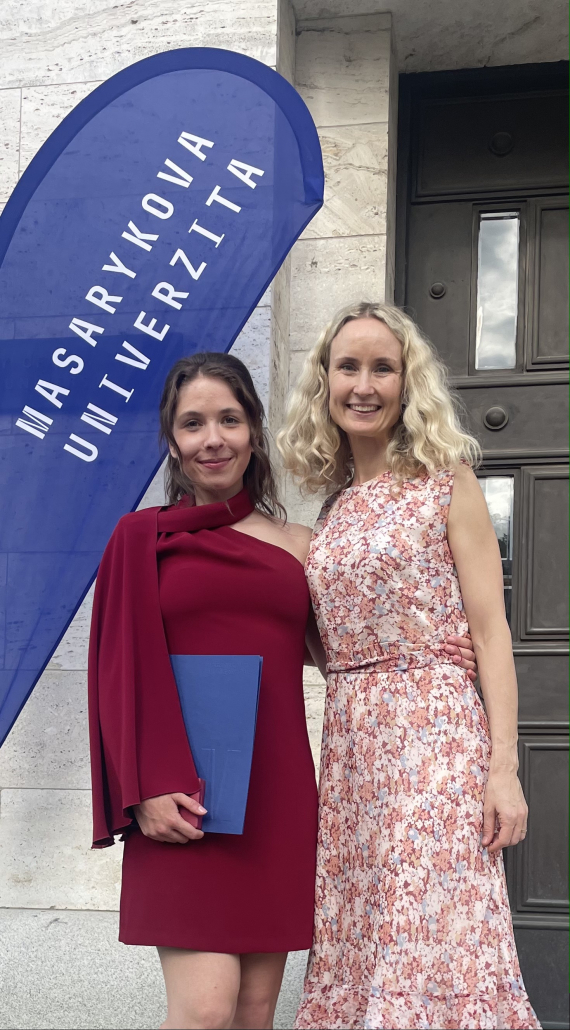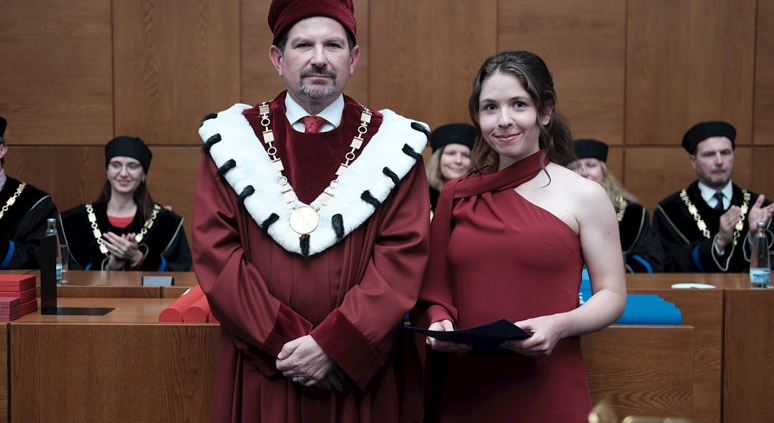Advice to young scientists? Don’t give up! There are many failures for every success, says Julia Anna Kent
Julia Anna Kent is a young and successful researcher. A student of General Medicine, she has been engaged in scientific activities since 2018 as part of the P-Pool program at the Faculty of Medicine, Masaryk University. Initially, she worked under the guidance of Prof. MUDr. Irena Rektorová, Ph.D., in the Applied Neuroscience research group at CEITEC MU. She is now part of the Stroke team led by Prof. MUDr. Robert Mikulík, Ph.D., and MUDr. Mgr. Ing. Petra Šedová, Ph.D., at the International Clinical Research Center (ICRC). At the end of May, she received the Masaryk University Rector’s Award for her outstanding results.

Julia is the recipient of the Masaryk University Rector’s Award.
Julia, you’ve spent a large part of your life in Prague. Why did you choose Brno and the Faculty of Medicine at MU for your studies?
I was drawn to the Faculty of Medicine at MU because of the P-Pool program, which wasn’t available in Prague. In Brno, it seems that science is more incorporated into university studies. After ten years in the capital city, I also needed a change (laughs).
What were your early scientific beginnings like?
I started at CEITEC MU in Professor Rektorová’s group. This gave me a chance to explore the world of science. Under the guidance of a Ph.D. student, I focused on non-invasive brain stimulation. This gave me my first experiences with conducting studies, and I must say, I had rather rosy ideas about science before…
In what way?
I thought it was a much quicker process. But it takes a long time to achieve any results, and it’s nowhere near as fast as people might think. I am grateful for the time I spent at CEITEC, but I also realized that this wasn’t the subject I wanted to pursue in the future.
So where were you drawn to? Away from neurology?
No, I’ve always wanted to do neurology; it’s my first choice. But I wasn’t sure what exactly I wanted to focus on within neurology. You can’t know for sure until you gain practical experience, such as through internships.
Did these thoughts affect your career in research?
I’ve always been interested in science. Neurology is an incredibly dynamic field that develops quickly compared to other fields, and there’s always something new to discover. I feel that many people see medicine and science as two separate fields, but they can’t function without each other! Without science, we wouldn’t be where we are in healthcare today. So it’s important not only to practice medicine but also to advance it. I also see it as our duty as scientists to give back to society, as we are funded by public money. These arguments were my main motivation for pursuing science and wanting to continue in it, even though it can sometimes be frustrating (laughs).
What do you find most challenging in this field? Is it the slow pace of processes?
I was quite surprised that in science, you never have secure funding. You fight for grants, living from one to the next. If you have an interesting topic, a good idea, you first need to present well why your research should be conducted and what its results would bring. I was also surprised by how long studies take. Often things don’t turn out as you hoped or planned. For example, just recruiting volunteers for a clinical study is a challenge… And even if the research is done well, getting published in a quality journal isn’t guaranteed. In short, it’s not an easy path.
Your next step was to the International Clinical Research Center (ICRC), specifically to the Stroke team led by Professor Mikulík. What topic did you work on there?
At ICRC, I started in the Neuroepidemiology group, which is part of the Stroke team. After a few months, I began collaborating with Dr. Šedová, and together with other scientists, we worked on a publication that was released at the beginning of 2023. The study focused on the impact of the COVID-19 pandemic on the number of hospitalizations for stroke patients. Dr. Šedová gave me a lot of freedom, allowing me to engage in real scientific work. I felt like a full-fledged team member, yet I always had someone to turn to. I was surprised by how much freedom and how many opportunities to work on research I was given. It was great.

Julia with her mentor, Dr. Petra Šedová.
What are you currently working on?
Dr. Šedová and I are working on a publication that deals with a similar topic to our first one. In addition to stroke, it also includes myocardial infarction. We are investigating how the COVID-19 pandemic affected the number of hospitalizations for stroke and myocardial infarction, now covering both years from the beginning of the pandemic in 2020 until February 2022. We are also trying to determine if there were any observable changes in the age or gender of hospitalized patients during the pandemic. We always compare the data with the pre-pandemic period.
What would you like to achieve one day? Do you have a dream?
I don’t have a precisely defined goal yet; I’m more open to seeing what life brings. I definitely want to achieve a Ph.D. title; I will focus on that in the future. However, I’m not entirely sure if I want to do research full-time or combine it with being a doctor.
Can you imagine a model, which is quite common at ICRC, where you split your time between clinical practice in a hospital and research?
Definitely. But I haven’t started working as a doctor yet, so we’ll see how I manage the workload. I expect that the work of a doctor will be very stressful and demanding, especially at the beginning. I am thinking about focusing fully on scientific work first and then starting my clinical career.
What challenges do you face as a young scientist?
I haven’t faced any outright prejudice or obstacles. What I am a bit worried about is balancing private life with work. Many people fear that a parental break might make them miss out on things. But everything can be managed. For example, my role model is Dr. Šedová, who shows that if you really want to, you can combine both.
What advice would you give to young students who want to follow a similar path?
Go abroad! Try to gain as much work experience as possible. There are many opportunities today, such as Erasmus+ or our student organization IFMSA. It’s also about not being afraid to reach out, even if there isn’t a listed position. Many students fear that they won’t be able to get clinical internships abroad due to language skills or competition, but it’s all about not being afraid and trying your luck. Additionally, don’t take it personally if you aren’t accepted. Often, it’s not because you’re not qualified enough, but because all spots are already taken. If this happens, it’s important to keep trying. I’m going on a clinical internship in Denmark for a month this summer, and one success like this cost me twenty rejection emails! In short, don’t get discouraged; it’s true that there are many failures for every success.
Martina Jelínková
martina.jelinkova@fnusa.cz



